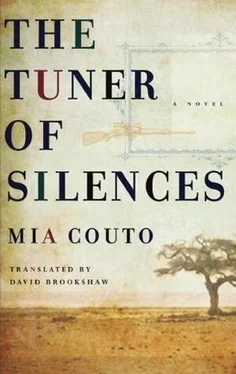The smell of the oil lamp burning is the only thing anchoring me to the ground. All the rest are indefinable vapours, unknown odours, angels whirling around me. Nothing precedes me, for I am inaugurating the world, light, shadow. More than this: I am founding words. I’m the one who launches them, I am the creator of my own language.
All this, Marcelo, reminds me of our nights in Lisbon. You would watch me in bed, while I rubbed beauty creams over my body. You complained there were too many: a lotion for the face, another for the neck, one for the hands, still another for around the eyes. They had been invented as if each part of me were a separate body and sustained its own particular beauty. As far as the sellers of cosmetics are concerned, it’s no longer enough that each woman has her body. Each one of us has various bodies that exist in a kind of confederation of autonomous states. That’s what you said as you sought to dissuade me.
Haunted by the fear of ageing, I allowed our relationship to grow old. Busy making myself beautiful, I allowed my true beauty, that which dwells in a candid look, to escape. The bed sheet grew cold, the bed played safe. That’s the difference: the woman you met over there, in Africa, is beautiful only for you. I was beautiful for me alone, which is another way of saying for no one.
This is what these black women have that we can never have: they are always their whole body. They live in every part of their body. Their whole body is woman, their time is feminine. While we white women live in a strange state of transhumance: sometimes we are soul, other times we are body. We aspire to soar on the wings of desire, only to then crash to the ground under the weight of our guilt.
Now that I’ve got here, suddenly, I don’t want to find you anymore. For me, it was a strange sensation, I who had travelled so far in my dream of reconquering you. But on my journey to Africa, this dream faltered. Perhaps I had waited too long. During my wait, I had learned to enjoy my yearning. I remember the verses of the poet, which go like this: “I came into the world to feel yearning.” As if I could only populate my mind through absence. Following the example of those houses that can only speak to the senses when they are empty. Like this house where I now live.

The pain of a fruit that has fallen to the ground, that’s what I feel. The portent of the seed, that’s what I await. As you can see, I am learning how to be both tree and earth, time and eternity.
— You’re like the earth. That’s your beauty.
That’s what you used to say. And when we kissed and I became breathless, I would ask you, between sighs: what day were you born? You would reply, your voice shaking: I’m being born now. And as you brought your hand up between my legs, I would ask you again: where were you born? And, almost voiceless, you would reply: I’m being born in you, my love. That’s what you said. You were a poet, Marcelo. I was your poetry. And when you wrote to me, what you told me was so beautiful that I would get undressed to read your letters. I could only read you when naked. For it wasn’t through my eyes that I received you, but with my whole body, line by line, pore by pore.

When I was still in the city, Aproximado asked me who I was, and I seemed to talk for the whole night. I told him everything about us, I told him almost everything about you, Marcelo. At one stage, perhaps because I was tired, I realized how surprised I was with the story I was telling. Secrets are fascinating because they were made in order to be revealed. I revealed secrets because I can no longer bear to live without fascination.
— You know, Miss Marta: the journey to the reserve is very dangerous.
I didn’t answer, but the truth is that I was only interested in travel if it involved crossing infernos, passing my soul through conflagrations.
— Tell me about this Marcelo. Your husband.
— Husband?
I’m used to this: women explain themselves to themselves by talking about their men. While if it were you, Marcelo, explaining me to other men, your words would transform me into a simple creature to be contained in the speech of one man alone.
— Last year, Marcelo came on a journey to Africa.
He came with the illusions of those who have lived in a place: on a pilgrimage to nostalgia. He stayed here for a month and when he returned, he had changed out of all recognition. Perhaps it was his re-encounter with this land that had unsettled him. It was in Mozambique that he fought as a soldier years before. He thought he had been sent to an unfamiliar land in order to kill. But he had been sent to kill a distant country. During that fatal operation, Marcelo had ended up being born as another person. Fifteen years later, it wasn’t the country he wanted to see again, but that process of birth he had gone through. I told him not to go. I had a strange foreboding about his journey. No memory can be revisited. Even more serious: there are memories that are only re-encountered in death.

I’ve told you this, Marcelo, because the pain of it all is like that of an ingrown nail. I need to talk, to gnaw this nail right down to the skin. You don’t know, Marcelo, how many deaths you made me die. For you came back from Africa, but part of you never returned. Every day, early in the morning, you would leave the house and wander the streets as if there was nothing you recognized in your city.
— Is this city no longer mine?
That’s what you would say to me. A land is ours just as a person may belong to us: without our ever taking possession. A few days after your return, I found a photo at the bottom of your drawer. It was a picture of a black woman. She was young, pretty, her pensive eyes defying the camera. On the back of the photo, there was a note in tiny handwriting: a telephone number. The miniature writing made it look like the merest scratch. But it was an abyss I kept falling back into repeatedly, every time I emerged from it.
My first impulse was to make a phone call. But I thought twice about it. What would I say? Then my fury prevailed, uncontained. I threw the photo back, face down, like one might do with a corpse one didn’t want to see the face of.
— You cheat, I hope you die of AIDS, and with fleas along with it. .
I wanted to mistreat you, Marcelo, I wanted to throw you in jail. So you would remain shackled to my rage. I was past caring about love. I spent endless, sleepless nights, waiting. I waited for you to return so that I could talk to you, but when you arrived, you were too exhausted to listen. You’d be less tired the next day. Then, when the next day came, you phoned me from the airport to say you were leaving again for Mozambique. For the first time, I was surprised by my own tone of voice. And I told you: “Well then, sleep. .” Just that. When what I wanted to say was: “Go and fuck your black girls once and for all.” My God, how ashamed I am of my anger and of how spiteful my emotions made me.
I remained in Lisbon, dominated by the part of me that had gone with you. It was a sad irony that the person who kept me company the most during your absence was your lover. The photograph of the other woman stared at me from the bedside table. And we would contemplate each other, day and night, as if we had been forever joined by some invisible connection. I would sometimes whisper my decision to her:
— I’m going to go and find him. .
But then your black mistress would counsel me: “Don’t go!” Let him sink in the dark mud by himself. I convinced myself of the irrevocable truth: my husband had disappeared forever, a victim of cannibalism. Marcelo had been devoured, just as had happened to others who’d left for darkest Africa. He had been swallowed up by a huge mouth, a mouth the size of a continent. He had been gobbled up by ancient mysteries. There are no longer any savages, only natives. But natives can be beautiful. Above all, native women can be beautiful. And it is from that beauty that their bygone savagery emerges. It is a savage beauty. White men, in the past oppressors who were fearful of being devoured, nowadays want to be eaten, swallowed up by black beauty.
Читать дальше













